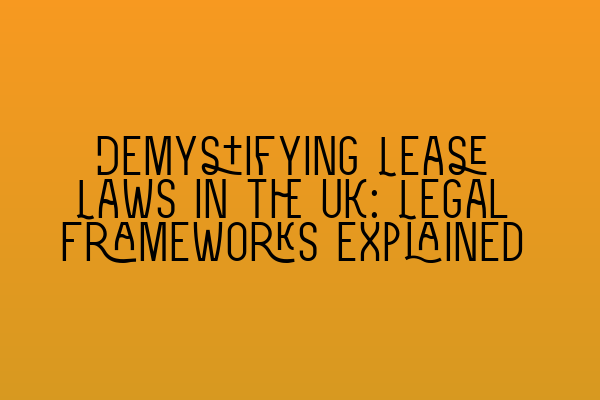Demystifying Lease Laws in the UK: Legal Frameworks Explained
Lease laws can often seem complex and confusing, but understanding the legal frameworks behind them is crucial for property owners, tenants, and anyone involved in property transactions. In this article, we will demystify lease laws in the UK, breaking them down into easily understandable concepts. Whether you are a solicitor, a property owner, or just curious about lease laws, this guide will provide valuable insights into the legalities surrounding leases.
Before we dive into the intricacies of lease laws, it is important to understand what a lease actually is. A lease is a legally binding contract between a property owner, known as the landlord, and a tenant, who wishes to occupy or use the property for a specified period of time. The lease outlines the rights and obligations of both parties, including the agreed-upon rent, duration of the lease, and any additional terms and conditions.
The Legal Frameworks: Freehold and Leasehold
In the UK, lease laws are primarily governed by two legal frameworks: freehold and leasehold. Understanding the differences between these frameworks is essential for grasping the legalities of leases.
Freehold refers to outright ownership of a property and the land it stands on. When a property is freehold, the owner has complete control and can occupy the property indefinitely. They are not subject to ground rent and have the right to sell, alter, or rent out the property as they see fit. Freehold properties are common for houses, providing individuals with full ownership and control.
On the other hand, leasehold refers to a property that is owned for a fixed period of time, known as the lease term. Leasehold properties are typically flats or apartments, where multiple units are owned within a larger building or complex. In a leasehold arrangement, the property owner holds a lease from the freehold owner, granting them the right to use and occupy the property for the specified lease term.
Leasehold properties come with certain obligations and restrictions. The lease agreement sets out these obligations, such as paying ground rent, service charges for maintenance and repairs, and adhering to any restrictions on alterations or subletting. It is imperative for both landlords and tenants to understand the lease terms and adhere to them to avoid any legal disputes.
The Lease Agreement: Essential Components
Now that we have a basic understanding of the legal frameworks, let’s delve deeper into the lease agreement itself. The lease agreement is a legally binding contract that outlines the rights and responsibilities of both the landlord and the tenant. It is crucial for the lease agreement to be drafted accurately and in compliance with the relevant laws and regulations to ensure its enforceability.
There are several key components that should be included in a lease agreement:
- Parties Involved: Clearly state the names and contact information of both the landlord and the tenant.
- Property Description: Provide a detailed description of the property being leased, including its address and any unique identifiers.
- Lease Term: Specify the duration of the lease, including the start and end dates. It is important to consider any renewal or termination provisions.
- Rent and Payment Terms: Clearly outline the amount of rent, how it should be paid, and when it is due. Include any provisions for rent increases.
- Deposit: State the amount of the security deposit and any conditions for its return at the end of the lease term.
- Repair and Maintenance: Define the responsibilities of both the landlord and the tenant for repairs and maintenance of the property.
- Restrictions and Permissions: Specify any restrictions on alterations, subletting, or other uses of the property. Include any permissions required from the landlord for certain activities.
- Termination: Set out the conditions for terminating the lease, including notice periods and any penalties for early termination.
- Dispute Resolution: Include provisions for resolving any disputes that may arise during the lease term.
It is advisable to seek the assistance of a solicitor specializing in property law to draft or review the lease agreement. This will ensure that all necessary provisions are included and that the agreement is legally binding and enforceable.
Leasehold Reform: Recent Changes and Future Developments
Leasehold laws in the UK have evolved over time, and recent changes have brought increased protection for leasehold property owners. The government has recognized the need for reform and has made efforts to address issues such as lease extensions, ground rents, and unfair practices.
One significant change is the introduction of the Leasehold Reform (Ground Rent) Bill, which aims to restrict ground rents on new residential leases to zero. This removes the burden of ground rent payments for leasehold property owners and provides them with more certainty and control over their properties.
Additionally, the government is considering reforms to the lease extension process, making it easier and more affordable for leasehold property owners to extend their leases. This will provide greater security and value to leasehold property owners, enabling them to fully enjoy their properties without the worry of lease term expiration.
If you’re looking for more information on the legal aspects of property law, the SQE preparation guide from SQE Property Law & Land Law will provide you with valuable insights and knowledge. You can find related articles such as:
- 48. Unlocking Legal Research Skills for SQE Success
- 62. SQE2: Everything You Need to Know About the Second Stage Exam
- 53. Functioning Legal Knowledge (FLK): Core Concepts for SQE Candidates
- 44. Essential SQE Textbooks: Building a Solid Foundation for Exam Prep
- 43. Unraveling the SQE Stages: A Roadmap to Success
Now that you have a better understanding of lease laws in the UK, you can approach property transactions and lease agreements with confidence. Remember to always seek legal advice from a qualified solicitor to ensure compliance with the law and protect your rights as a property owner or tenant.
